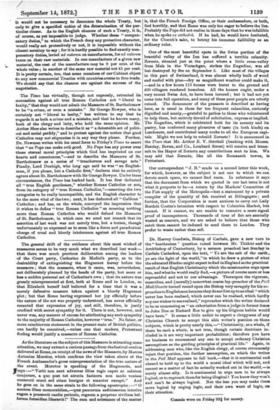The Times has virtually, though not expressly, retracted its accusation
against all true Roman Catholics not "liberal to laxity," that they would not admit the Massacre of St. Bartholomew to be "a crime, or even a mistake." Sir George Bowyer, who is -certainly not "liberal to laxity," has written to say that he regards it as both a crime and a mistake, and that he knows many, both of the clergy and laity, who hold the same opinion. Mr. Archer Shee also writes to describe it as "a detestable act of politi- cal and social perfidy," and to protest against the notion that good -Catholics may not stigmatise it in any way they please. Further, Dr. Newman writes with his usual force to Friday's Times to assert that "no Pope can make evil good. No Pope has any power over -those eternal moral principles which God has imprinted on our hearts and consciences,"—and to describe the Massacre of St. Bartholomew as a series of "treacherous and savage acts." Finally, Lord Denbigh, who long ago said he was "an English- man, if you please, but a Catholic first," declares that he entirely agrees about St. Bartholomew with Sir George Bowyer. Under these circumstances, the Times has harked back. It has first deducted all "true English gentlemen," whether Roman Catholics or not, from its category of "true Roman Catholics,"—asserting the two -categories to be really incompatible, and the English character to be the more vital of the two ; next, it has deducted all " Gallican " "Catholics; and has, on the whole, conveyed the impression that it wishes to define "true Roman Catholics" as meaning nothing more than Roman Catholics who would defend the Massacre -of St. Bartholomew, in which case we need not remark that its -assertion of last week was not merely true, but a truism, though unfortunately so expressed as to seem like a fierce and paradoxical charge of cruel and bloody intolerance against all true Roman Catholics.


































 Previous page
Previous page